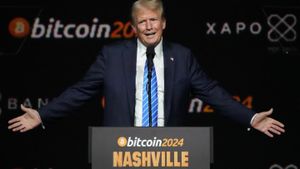Yoel Romero’s shocking claims about the aftermath of his 2015 bout with Lyoto Machida have sparked discussions about the health risks associated with mixed martial arts (MMA). Romero, who knocked out Machida at UFC Hollywood, Florida, asserted recently during his appearance on the YouTube show "Overdogs Espanol" that the Brazilian fighter went comatose following their matchup.
According to Romero, who was able to secure the victory with what he described as brutal damage to Machida, this incident has adversely affected Machida’s fighting career. He believes the knock-out not only marked a pivotal moment but set off what Romero describes as catastrophic subsequent outcomes for Machida, who, after their fight, lost five out of his next nine outings inside the octagon.
"After he fought with me, he was never the same. He suffered brutal damage. You know he went comatose, right? He was in a coma, and I was worried about him. I talked with his manager because he was comatose. That’s why I respect any fighter who does this, because they are risking their life," Romero stated, indicating deep concerns over the physical toll professional fighting can exact.
While Romero’s comments add to the grim narrative around the dangers of combat sports, there remains no concrete evidence to support his claims of Machida entering a coma. Machida's camp has yet to confirm or deny the allegations, leaving many fans and commentators questioning whether the severity of the injuries sustained during fights is being accurately portrayed.
Interestingly, both fighters now find themselves linked through their association with the newly formed Global Fight League (GFL), which introduces innovative team-based competitions to MMA. Romero, at 46 years old, is actively competing within the league, whereas Machida has transitioned to a managerial role for the São Paulo team. This shift reflects the expected trajectories of talent within the sport as seasoned athletes seek ways to remain involved.
Despite the camaraderie seen from their renewed partnership within GFL, the notion of a rematch between the two remains unlikely. Romero has moved on with his career, solidifying his place as one of the active fighters, whereas Machida's focus has shifted to guiding others within the league.
The allegations raised by Romero do shine a light on the broader issue of fighter safety and the aftereffects of weighty knockouts, particularly as the sport grows and garners more spectators. The echo of their interactions offers insight not only on their personal narratives but also serves as commentary on the need for greater awareness concerning fighters' welfare post-combat.
Romero's story aligns with concerns raised by numerous health professionals who caution against the physical repercussions fighters face even when they are not immediately apparent. With MMA rising in popularity, it's becoming clear there is more to discuss than just the fight itself—it's about respect, safety precautions, and long-term health impacts.
Looking forward, fans and analysts alike are likely to continue reflecting upon both these prominent figures and their legacies within MMA. Romero’s potent recollections strike at the heart of what many regard as the unknowable burdens fighters carry once they retire from active competition, particularly when catastrophic events occur.



